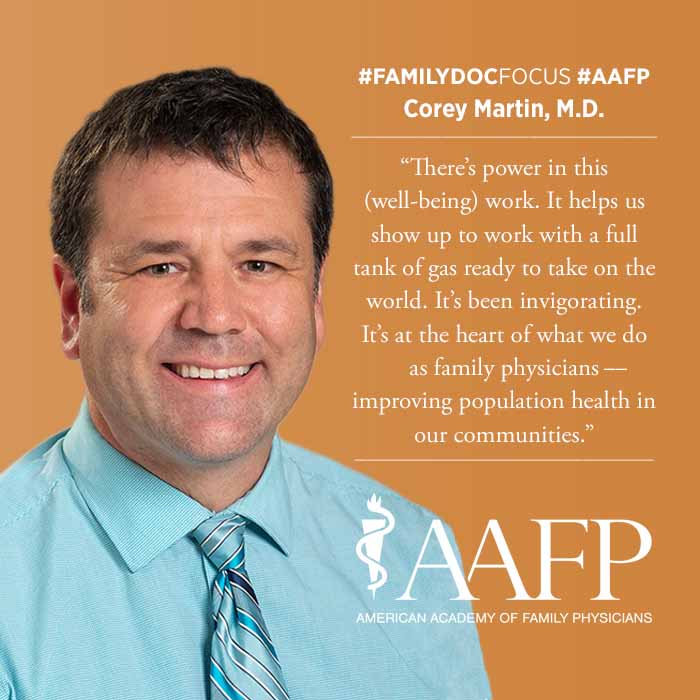Colleagues’ Deaths Inspired FP to Bounce Back
February 10, 2020 02:16 pm David Mitchell -- On a fall day in 2014, family physician Corey Martin, M.D., walked into his hospital's same-day surgery center where his patient was scheduled for a colonoscopy. Although there was nothing remarkable about the procedure, Martin remembers the day clearly because it was the day after a pediatrician had taken his own life in the hospital chapel.

The words he heard from a colleague upon entering the surgery center affected the way he -- and his community -- dealt with the loss.
"Our medical secretary at the desk looked at me and said, 'I'm so glad to see you are here today. When I heard the news yesterday, I thought it was going to be you,'" Martin said. "It was a defining moment in my life."
Martin had experienced symptoms of burnout early in practice and had moved into administration in an effort to reduce his load in clinic. Was his burnout that obvious to others?
"Five years into practice I was burned out," said Martin, who was the director of medical affairs at Buffalo Hospital in Buffalo, Minn., at the time. "I didn't want to do medicine anymore."
Martin wasn't the only one struggling. The pediatrician's suicide happened just three months after an obstetrician -- who had delivered thousands of babies in the small community -- died in a motorcycle accident.
"They were core people in the community," Martin said.
Physicians and hospital leaders subsequently participated in a conference focused on promoting resiliency and decreasing burnout.
"It was a way for us to get through the pain and suffering, but we realized that something that works for us would work for the community, too," he said.
Martin became one of the founders of the Bounce Back Project. The collaborative effort of physicians, nurses, hospital leaders, staff and community partners in Wright County aims to promote health through happiness.
"The best way to predict happiness and health is through the power of relationships," Martin said. "We asked ourselves, how do we improve relationships with family, patients and co-workers? How do we make sure we all have people we can count on?"
The project launched with the intention of introducing a new topic or tool every quarter. The first topic was performing acts of kindness. Martin said the 20-minute talk was delivered 83 times in three months in schools, churches, meetings with civic leaders and other venues, stressing not only the value of good deeds to the recipients, but also the science that shows how such acts benefit the people who do them.
The project moved on to gratitude and how keeping track of things you are grateful for can improve happiness and reduce stress, "like medicine," Martin said.
In the first year alone, more than 6,000 people heard Bounce Back Project presentations.
"The best thing that happened is that our schools have embraced it," Martin said.
And not just students. Martin said organizers wanted parents to be aware of what students were reading related to the program, and roughly 1,500 people have participated in book groups that meet in places such as area bookstores, churches, schools and even wine bars.
The statistics say the nonprofit program is working. The number of children from the local school district who have been seen in the local emergency department because of suicide, suicide attempts, anxiety and depression dropped 40% in four years. For adults, the decrease was 15%.
"There's power in this work," said Martin. "It helps us show up to work with a full tank of gas ready to take on the world. It's been invigorating. It's at the heart of what we do as family physicians -- improving population health in our communities."
Now, more than five years after he lost two colleagues in just a few months, Martin said he is a "recovering perfectionist and an aspiring 'good enough-ist.'" In addition to being a practicing family physician, he works as a consultant to health care organizations responding to clinician burnout and facilitates resilience retreats nationally and internationally.
Martin will share his experience with the Bounce Back Project in a mainstage presentation during the AAFP's Physician Health and Well-being Conference, April 15-18 in San Antonio. He also will speak at breakout sessions on self-care, time management and setting priorities.